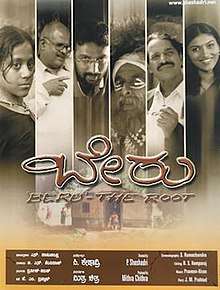Beru (film)
Beru (Kannada: ಬೇರು, Root) is a 2005 Indian Kannada language satirical film directed by P. Sheshadri starring Suchendra Prasad, H. G. Dattatreya, Neethu and M. P. Venkatarao in the lead roles.
| Beru | |
|---|---|
 Film Poster | |
| Directed by | P. Sheshadri |
| Produced by | M/S Mitrachitra |
| Screenplay by |
|
| Starring |
|
| Music by | Pravin Godkhindi |
| Cinematography | S. Ramachandra |
| Edited by | B.S.Kemparaju |
Release date |
|
Running time | 109 minutes |
| Country | India |
| Language | Kannada |
The film was awarded the National Film Award for Best Feature Film in Kannada at the 52nd National Film Awards[1]
Concept
A governing system, big or small, is meant for service to people and development activities. But the degradation of moral values, lack of commitment, and the overall apathy of the public to the commissions and omissions of the system can lead to dangerous situations. The system may degenerate into self-seeking and -protecting power centers instead of being proactive service centers. When that happens, the system becomes breeding ground of corruption and scandals, manipulations and cover-ups. That leaves little time for bureaucracy to look into the basic objectives of ‘service’ and ‘development’. Even honest individuals who want to do good get sucked into this stinking system. In time, the whole system becomes insensitive and indifferent to the nagging problems of common people, resulting in mounting miseries. This is a situation in which the zone of tolerance of the common people starts shrinking. One untoward incident is enough to kindle the spark of rejection of the system.
Beru (The Root) is an attempt to give a wake-up call to raise the consciousness of society about many such issues.
Cast
H.G. Dattatreya as venkateshaiah
Neethu as suma
T.N. Seetharam as district collector
Suchendra prasad as raghunandan
M.P. venkatarao as Goravaih
Lakshmi Chandrashekar as mad women
Vidyamurthy as kamalamma
Baby sowmya as gowri
Shivakumar as peon
Plot
A taluk-level office has been functioning without a regular head for some time. A junior level official is in charge of the office. It has stuck to mandatory minimal ‘routine’ work.
Goravayya is a poor, old, folk artist. Though living on a small income, he has been magnanimous in his own way to provide shelter to an orphan girl. He is stuck with a problem. The roots of a tree are affecting the stability of his small shelter. He has been repeatedly requesting the office for permission to fell the tree. ‘Come later’ has been the standard reply.
At last, a regular officer arrives on posting. Being sincere and enthusiastic, this new officer starts tuning the office for proactive working. Even before he settles down, a minister’s visit is announced. Arrangements have to be made in the Inspection Bungalow (IB). Much to his shock and surprise, nobody in the office knows about the IB! In the process of locating this IB, a scandal unfolds. The IB exists only on records: It is not there physically. Many irregularities and misappropriations come to light. The new officer is not able to report the matter to higher-ups because of his own indiscretion and emotional considerations. He tries to cover up by seeking approval for demolition of the ‘dilapidated’ (non-existent) IB and for building a new one.
Meanwhile, the minister’s visit is canceled. But by then, the officer is deeply involved in the cover-up story. He is about to face the consequences. But his influential father-in-law comes to his rescue. He is asked to provide some cooked-up reasons for the IB’s ‘present’ condition so that the matter can be hushed up, and he is saved. Goravayya is proposed to be implicated as the ‘servant looking after IB’ responsible for its present condition. On seeing the reluctance of the officer to go ahead with this proposal, the junior official takes the responsibility for coaxing Goravayya for his being implicated. They go to see Goravayya only to find that his shelter has collapsed.
Awards

- 2004: 52nd National Film Awards: Best Film in Kannada: Beru [2]
- 2004-05 Karnataka State Film Awards
- 2nd Best Film
- Best Lyricist - Krishnamurthy Hanur and Lakshmipathi Kolar
References
- "National Award for the Best Writing in Cinema : Regulations" (PDF). Dff.nic.in. Archived from the original (PDF) on 23 September 2015. Retrieved 17 August 2013.
- "52nd National Film Awards" (PDF). Directorate of Film Festivals.